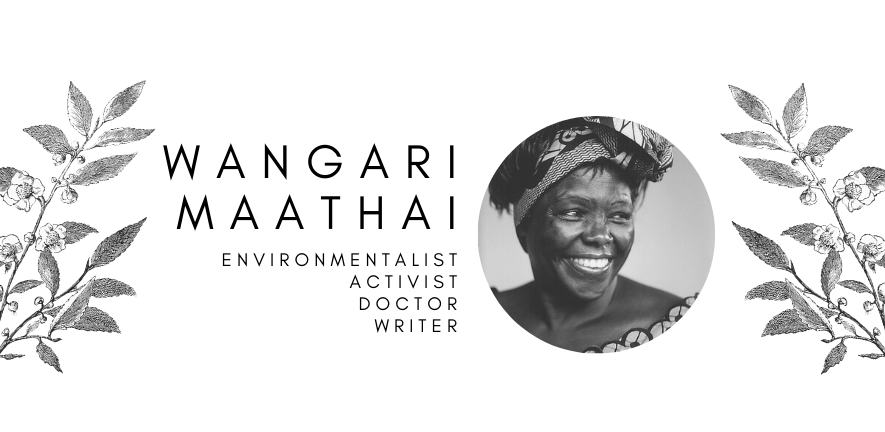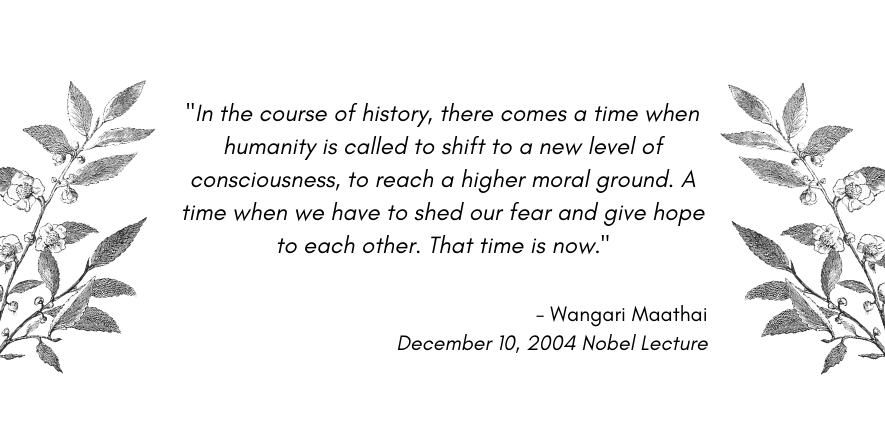
Wangari Maathai (1940-2011) was the founder of the Green Belt Movement and the first African woman to receive the Nobel Peace Prize, the first female scholar from East and Central Africa to take a doctorate (in biology), and the first female professor ever in her home country of Kenya.
Wangari Muta Maathai was born in Nyeri, a rural area of Kenya (Africa), in 1940. She obtained a degree in Biological Sciences from Mount St. Scholastica College in Atchison, Kansas (1964), a Master of Science degree from the University of Pittsburgh (1966), and pursued doctoral studies in Germany and the University of Nairobi, before obtaining a Ph.D. (1971) from the University of Nairobi, where she also taught veterinary anatomy. The first woman in East and Central Africa to earn a doctorate degree, Professor Maathai became chair of the Department of Veterinary Anatomy and an associate professor in 1976 and 1977 respectively.
In 1977 she started a grass-roots movement aimed at countering the deforestation that was threatening the means of subsistence of the agricultural population. The campaign encouraged women to plant trees in their local environments and to think ecologically. The so-called Green Belt Movement spread to other African countries, and contributed to the planting of over thirty million trees.
Maathai played an active part in the struggle for democracy in Kenya, and belonged to the opposition to Daniel arap Moi's regime. Her mobilisation of African women was not limited in its vision to work for sustainable development; she saw tree-planting in a broader perspective which included democracy, women's rights, and international solidarity.
Wangari Maathai was awarded the Nobel Peace Prize in 2004. In its citation, the Norwegian Nobel Committee noted Professor Maathai’s contribution to “sustainable development, democracy and peace.” The Committee further stated that Professor Maathai “stands at the front of the fight to promote ecologically viable social, economic and cultural development in Kenya and in Africa. She has taken a holistic approach to sustainable development that embraces democracy, human rights and women’s rights in particular. She thinks globally and acts locally.” In accepting the award, Professor Maathai said: “I believe the Nobel committee was sending a message that protecting and restoring the environment contributes to peace; it is peace work. . . . I always felt that our work was not simply about planting trees. It was about inspiring people to take charge of their environment, the system that governed them, their lives, and their future.”
Maathai authored four books: The Green Belt Movement; Unbowed: A Memoir; The Challenge for Africa; and Replenishing the Earth. As well as having been featured in a number of books, she and the Green Belt Movement were the subject of a documentary film, Taking Root: the Vision of Wangari Maathai (Marlboro Productions, 2008).
In recognition of her deep commitment to the environment, the United Nations (UN) Secretary-General named Professor Maathai a UN Messenger of Peace in December 2009, with a focus on the environment and climate change. In 2010 she was appointed to the Millennium Development Goals Advocacy Group: a panel of political leaders, business people and activists established with the aim to galvanise worldwide support for the achievement of the Millennium Development Goals (MDGs), and became a trustee of the Karura Forest Environmental Education Trust, established to safeguard the public land for whose protection she had fought for almost twenty years. That same year, in partnership with the University of Nairobi, she founded the Wangari Maathai Institute for Peace and Environmental Studies (WMI). The WMI will bring together academic research—e.g. in land use, forestry, agriculture, resource-based conflicts, and peace studies—with the Green Belt Movement approach and members of the organisation.
Professor Maathai died on 25 September 2011 at the age of 71 after a battle with ovarian cancer. Memorial ceremonies were held in Kenya, New York, San Francisco, and London.

